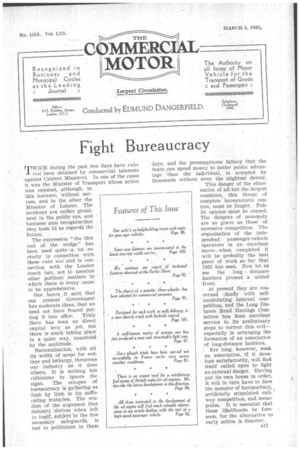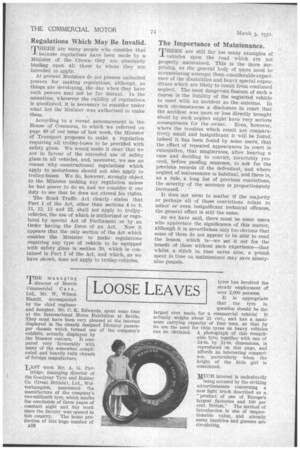Fight Bureaucracy
Page 35

Page 36

If you've noticed an error in this article please click here to report it so we can fix it.
The exPression " the thin end of the, wedge"• has been used quite a lot xeantly I in connection with these rules nisi and in connection with the London coach ban; not to mention other political matters -in which there is every cause to be apprehensive.
One hears, it said that our present Government has moderate ideas, that we need not have feared put ting tt into office. Truly there has been no direct capital levy as yet, but there is much taking place in a quiet way, unnoticed by the multitude.
Nationalization, with all its width of scope for redtape and lethargy, threatens our industry as it does others. It is nothing but ridiculous to ignore the signs. The octopus of bureaucracy is gathering us limb by limb in its suffocating tentacles. The wisdom of the. argument argument that industry thrives when left to itself, subjed-to the few necessary safeguards, is lost to politicians in these days, and the presumptuous fallacy that the State can spend money to better public advantage than the individual, is accepted by thousands without even the slightest demur.
This danger of the elimination of all but-the largest combines, this threat of complete bureaucratic control, must be fought. Public opinion must be roused. The dangers of monopoly are as grave as those of excessive competition. The organization of the independent passenger-vehicle operators is an excellent move—when completed it will be probably the best piece of work so far that 1931 has seen. Now let us see the long distance hauliers present a united 'front.
At present they are concerned chiefly with selfannihilating internal competition, and the Long Distance Road Haulage Committee has done excellent service in its preliminary steps to correct this evil— especially in arranging the formation of an association of long-distance' hauliers.
Ere long, however, such an association, if it develops satisfactorily, will find itself called upon to fight an external danger. Having put its own house in order, it will in turn have to face the monster of bureaucracy, artificially stimulated railt way conipetition, and monopolies. It is essential that these likelihoods be foreseen, for the alternative to early action is disaster.
Regulations Which May Be Invalid.
THERE are many people who •consider that because regulations have been made by a Minister of the Crown they are absolutely binding upon all those to• whom they are intended to apply.
At present Ministers do not possess unlimited powers for making regulations, although, as things are developing, the day when they have such powers may not be far distant. In the meantime, whenever the validity of regulations is questioned, it is necessary to consider under what Act the Minister was authorized to make them.
According to a recent announcement in the House of Commons, to which we referred on page 49 of our issue of last week, the Minister of Transport proposes to make a regulation requiring all trolley-buses to be provided with safety glass. We would make it clear that we are in favour of the extended use of safety glass in all vehicles, and, moreover, we see no reason why constructional regulations which apply to motorbuses should not also apply to trolley-buses. We do, however, strongly object to the Minister making any regulation unless he has power to do so, and we consider it our duty to see that he does not exceed his rights.
The Road Traffic Act clearly states that Part I of the Act, other than sections 4 to 8, 11, 12, 15 and 23, shall not apply to troneyvehicles, the use of which is authorized or regulated by special Act of Parliament or by an Order having the force of an Act. Nowit appears that the only section of the Act which enables the Minister to make regulations requiring any type of vehicle to be equipped with safety glass is section 30, which is contained in Part I of the Act, and which,. as we have shown, does not apply to trolley-vehicles.
The Importance of Maintenance.
ritHERE are still far too many examples of vehicles upon the road which are not properly maintained. This is the more surprising, as the general body of users must be accumulating amongst them considerable experience of the disabilities and heavy special expenditure which are likely to result from continued neglect. The most dangerous feature of such a course is the liability of the negleeted vehicle to meet with an accident as the outcome. In such circumstances a disclosure in court that the accident was more or less directly brought about by such neglect might have very serious consequences for the owner. Even, however, where the troubles which result are comparatively small and insignificant it will be found, indeed it has been found by some users, that the effect of repeated appearances. in court is cumulative, that magistrates, after hearing a case and deciding to convict, invariably proceed, before passring sentence, to ask for the previous records of the defendant, and where neglect of maintenance is habitual, and there is, as a rule, a long list of previous convictions, the severity of the sentence is proportionately -increased.
It does not seem to matter if the majority or perhaps all of those convictions relate to minor or even insignificant technical offences, the general effect is still the same.
As we have said, there must be some users who appreciate the significance of this matter, although it is nevertheless only too obvious that some of them do not appear to be able to read the lesson, which is—we set it out for the benefit of those without such experience—that whilst a stitch in time saves nine, a pound spent in time on maintenance may save ninetynine pounds.




































































































